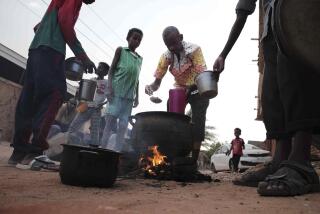Oil Company in Sudan
- Share via
Re “As in South Africa, It’s Time to Let Our Wallets Do the Talking,” Commentary, Aug. 30: Eric Reeves makes several erroneous statements about Talisman Energy and Sudan. There is a long-standing civil war in Sudan, of complex origins, in which tribal rivalries play a major complicating role. Fighting is associated with cattle-raiding and hostage-taking, traditionally settled by exchanging hostages for cattle. This is abhorrent activity but not normally called “slavery.”
Reeves alleges clearance of populations near the oil development. In fact, they are located in the midst of open plains with no permanent settlements. He states that 5% of the revenues go to Khartoum, whereas, after costs, the government will receive approximately 70% of the revenue, and the pipeline reverts to the government after 16 years. Among other things, the 1997 Khartoum agreement offered a formula for distributing natural resource wealth widely recognized as fair.
The situation in Sudan is easily sensationalized. Due to the lack of government representation by Canada and the U.S., a one-sided picture emerges in North America. Several European countries with representation in Khartoum report a more balanced picture. Sudan needs peace. Peace encourages investment and revenue to provide roads, schools and hospitals. Sudan needs more, not less, investment.
J.W. BUCKEE, President
Talisman Energy
Calgary, Alberta
More to Read
Sign up for Essential California
The most important California stories and recommendations in your inbox every morning.
You may occasionally receive promotional content from the Los Angeles Times.













